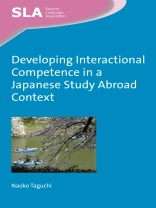In the process of second language acquisition, the ability to interact effectively is critical. But what does it mean to be interactively competent? This book addresses this question by presenting research on the development of interactional competence among learners of Japanese as a second language. Qualitative data collected on learners studying abroad in Japan is evaluated to explain changes in their interactional competence and provides specific insights into the learning of Japanese. The situated analysis of multiple data sets generates meaningful interpretations of the development of interactional competence in the development of interactional competence and the learner-specific factors that shape developmental trajectories. Moreover, the context of the research provides insights into the types of learning resources and experiences that study abroad provides to assist learners’ in their progress towards becoming a competent speaker in the target community.
Cuprins
Chapter 1 – Interactional Competence in Japanese Study Abroad: An Introduction
Chapter 2 – Linguistic and Interactional Resources in Japanese Conversation: Speech Styles and Incomplete Sentence Endings
Chapter 3 – Context of Study: Study Abroad as a Site for Language Learning
Chapter 4 – Methods of the Study
Chapter 5 – Speech Styles
Chapter 6 – Style Shifting Across Discourse Boundaries
Chapter 7 – Incomplete Sentences in Joint Turn Construction
Chapter 8 – Case Histories of Interactional Development and Study Abroad Experience
Chapter 9 – Conclusion
References
Appendices
Despre autor
Naoko Taguchi is Associate Professor in the Modern Languages Department at Carnegie Mellon University. Her research interests include second language pragmatics, classroom-based research, English-medium education and Japanese SLA. Her recent publications include Context, Individual Differences and Pragmatic Competence (Multilingual Matters, 2014) and Technology in Interlanguage Pragmatics Research and Teaching (coedited with Julie Sykes, John Benjamins, 2013).












